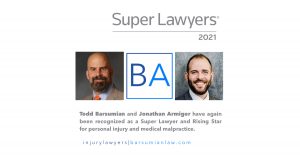Barsumian and Armiger Recognized by Indiana Super Lawyers in 2021

Super Lawyers rates Indiana attorneys on a yearly basis in more than 70 different practice areas, including personal injury and medical malpractice. Following its completion of a peer review process, together with a patented evaluation process, the organization determines the lawyers in Indiana it will include on its Super Lawyers and Rising Stars list and announces those named online and in its Super Lawyers Magazine. Super Lawyers rates attorneys nationwide among their peers for their respective states and areas of practice.
This year marks Barsumian’s fourth consecutive selection as a Super Lawyer in the field of personal injury. Super Lawyers recognizes no more than 5 percent of the attorneys in Indiana. Barsumian was previously selected as a Rising Star on four occasions. Armiger, recognized for the area of medical malpractice, has now been selected to the Rising Star list on five occasions. The Rising Stars designation recognizes attorneys 40 years old or younger and represents only 2.5 percent of the attorneys in Indiana.
Barsumian and Armiger are proud of this recognition and look forward to continuing to serve their clients in the Indianapolis and Evansville area in the areas of personal injury, medical malpractice, and wrongful death.
 Indiana Personal Injury Lawyer and Medical Malpractice Attorney Blog
Indiana Personal Injury Lawyer and Medical Malpractice Attorney Blog



















